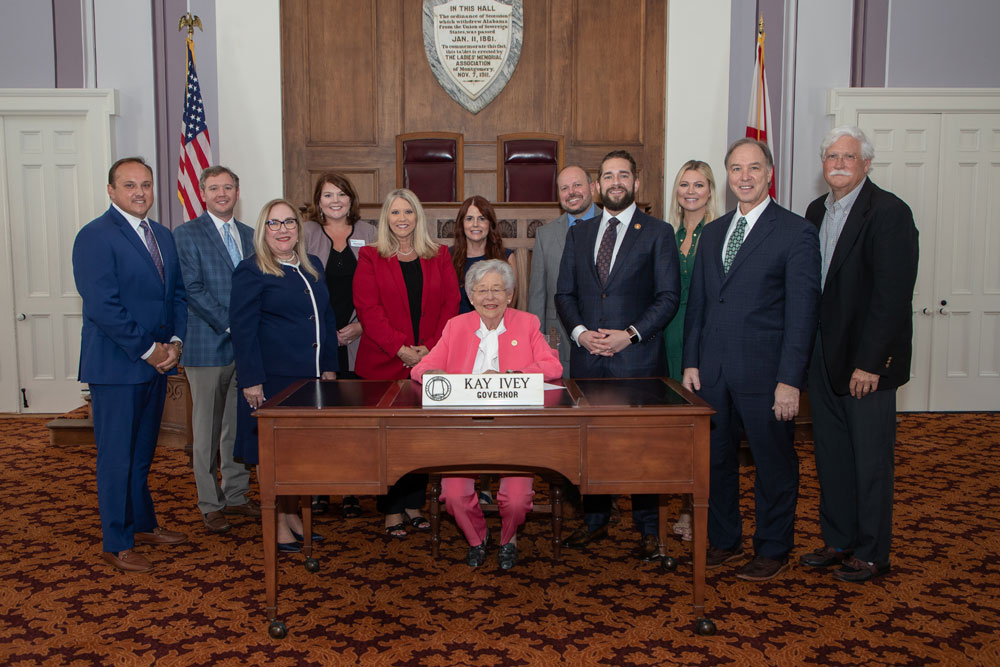 Gov. Kay Ivey signs the bill. Alabama AHEC Associate Director and UAB Family and Community Medicine Assistant Professor Becky Reamey looked on, third from left in the second row.
Gov. Kay Ivey signs the bill. Alabama AHEC Associate Director and UAB Family and Community Medicine Assistant Professor Becky Reamey looked on, third from left in the second row.
On Thursday, Alabama Gov. Kay Ivey signed into law a new Preceptor Tax Incentive Program to provide tax credit incentives to increase medical student training in rural and underserved counties in Alabama.
The bill that Ivey signed, HB133, provides a $500 income tax credit incentive for each 160-hour clinical preceptorship rotation per calendar year for what would otherwise be unpaid work by community-based faculty preceptor positions. Precepting physicians are eligible for a maximum of $6,000 per calendar year. Similarly, the law provides a $425 tax incentive for each 160-hour clinical preceptorship rotation per calendar year for preceptors who are nurse practitioners, certified nurse midwives, certified registered nurse anesthetists or physician assistants, with a $5,100 annual maximum.
Preceptors – medical providers who welcome student learners into their clinic to shadow them and gain experience – are a critical part of medical education and clinical placements give aspiring providers essential experience and mentorship. However, it can be difficult to place students in rural or underserved areas, where clinics are often resource-strapped and, prior to this law, did not have a financial incentive to take on learners.
In Alabama, this problem has contributed to a critical shortage of primary care physicians, particularly in rural and underserved areas. A study from the Robert Graham Center predicts that Alabama will need 612 new primary care physicians by 2030 just to maintain the status quo. Currently, while approximately 37% of the state’s population lives in rural areas, only 24% of primary care physicians practice in those areas.
“In order to recruit and retain primary care physicians and address Alabama’s primary care shortages, we need to place aspiring physicians with preceptors in these rural and underserved areas,” said Irfan Asif, M.D., chair of UAB’s Department of Family and Community Medicine and associate dean for primary care and rural health at UAB. “As they work in these clinics, students build relationships with providers and patients, gain a better understanding of the opportunities and challenges of practicing healthcare in a rural setting and, we hope, remain motivated to serve in these areas after graduation and residency.”
Alabama Statewide Area Health Education Centers, Alabama AHEC, based in the UAB Department of Family and Community Medicine was a key advocate for HB133 and has worked for years to get a preceptor tax incentive program signed into law. Associate Director Becky Reamey, Ph.D., also an assistant professor in the Department of Family and Community Medicine, led many of these efforts.
Alabama AHEC’s mission particularly focuses on developing the rural healthcare workforce, with programming focused on workforce recruitment and development, continuing education, bridging educational gaps and diversifying the workforce.
Both Alabama AHEC and the Department of Family and Community Medicine have implemented additional programming to address the primary care shortage in Alabama. In 2020, the department launched its Comprehensive Urban Underserved and Rural Experience, or CU2RE, program. This program, funded by nearly $18 million in HRSA federal grants, is designed to recruit, train and retain medical students interested in primary care in rural and urban underserved areas. Students apply for and begin the program during their first year of medical school at UAB and benefit from specialized workshops, one-on-one mentorship, early clinical experience, and a dedicated summer program between their first and second year.
Additionally, the Cahaba-UAB Family Medicine Residency, a partnership between the UAB Department of Family and Community Medicine and Cahaba Medical Care, places 20 residents annually on four tracks that cover much of the state: an Urban Track, a Rural Track, a Frontier Track based in Alabama’s Black Belt and a Highlands Track at UAB Hospital – Highlands in Birmingham. The UAB Selma Family Medicine Residency also brings family medicine residents and UAB faculty into Selma, which serves as the referral center for seven surrounding counties.
To receive updates about the Alabama PTIP program, join the AHEC mailing list at alahec.org.
To learn more about Alabama AHEC please visit, alahec.org.